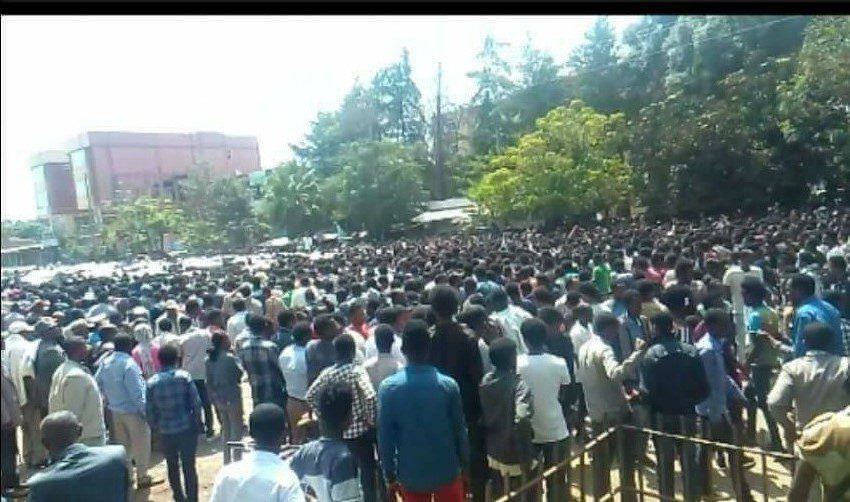Large crowds on Wednesday gathered at Menelik square in Ethiopia’s capital, Addis Ababa to commemorate 126 Adwa Victory and protest the government’s decision to change the venue of the celebration.
Crowds carrying Ethiopian flags and wearing T-shirts with photo printed of Emperor Menelik and Empress Taitu denounced the government’s attempt to belittling the role played by the emperor who led the fight and defeated the invading Italian Colonial Army at the battle of Adwa in 1896.
This year, there have been reports that government authorities imposed restrictions on Ethiopians not to celebrate Adwa victory at the Menelik II Statue near St. George Church in the centre of the city.
The matter triggered extensive controversy and Ethiopians took it to social media to blast what they call government sabotage to detach the victory of Adwa from emperor Menelik II. Government wants much of the celebration to take place at Adwa bridge where there is no Statue of the Emperor or the Empress.
Addis Ababa police temporarily closed a portion of the streets leading to the Menelik Square until they were overwhelmed by angry protesters.
Adwa is celebrated as a symbol of Ethiopia’s unity, said the some of the people in the crowd and denounced police’s intimidations against celebrants wearing T- shirts with photo printed of Emperor Menelik and his wife Empress Taitu.
Emperor Menelik II and his wife Empress Taitu led the Ethiopian army in person, travelling from the capital all the way to Adwa. The Empress herself is recorded in the history of battle of Adwa as one of the best military strategists.
The victory had been an inspiration in the entire African continent during the struggle against colonialism.
In Ethiopia, it had been politicized since the TPLF took over central government power in 1991. The radical ethnic Oromo nationalist group, under whose political influence prime minister Abiy Ahmed seems to function in recent months, has been more vocal in tarnishing the shining Adwa victory and the stellar leadership of Emperor Menelik II.
For radical ethnic politicians and their crowds, Emperor Menelik was a “colonizer.” For Ethiopians and the rest of the black people, Menelik is an icon of resistance to oppression of the black race.
This year, there have been reports that government authorities imposed restrictions on Ethiopians not to celebrate Adwa victory at the Menelik II Statue near St. George Church in the centre of the city.
The matter triggered extensive controversy and Ethiopians took it to social media to blast what they call government sabotage to detach the victory of Adwa from emperor Menelik II. Government wants much of the celebration to take place at Adwa bridge where there is no Statue of the Emperor or the Empress.
Government security task force claims that the resistance agenda to the government event plan is initiated by “those who do not want the celebration to be peaceful.”
On the other hand Ethiopians are questioning why the government is all the time throwing an agenda that thwarts the spirit of Ethiopianism. For some, it is a cover to implement radical ethnic Oromo nationalist, who are said to have infiltrated by arrangement and in large numbers different levels of government structures, agenda at the expense of what Ethiopians hold dear.
For others, the radical group can not conceal extensive and organised looting under the cover of government power, just like what Tigray People’s Liberation Front (TPLF) used to do, without throwing an agenda that outrages and engages the public. The Prime Minister recently admitted the matter when he said, in his appearance at the parliament, that he does not want to be labelled as a thief because of those who steal government resources. He encouraged investigative journalism by state-owned media.
He has however lost considerable public trust. One of the mistrust is that the radical ethnic Oromo forces, within and outside of his government, are trying to Oromize Ethiopia and Ethiopian history by exploiting their new gained absolute dominance over the central government. But the Prime Minister’s public rhetoric does not give any clue about this agenda as he paints himself as a champion of Ethiopia’s cause.
Changing the Adwa Victory celebration place from near Emperor Menelik Statue to Adwa bridge is seen as a manifestation of hate towards Menelik. Dubbed as one of the most skilful, farsighted and benevolent Ethiopian emperors, his legacy seems to be unending one.
MG/abj/APA


